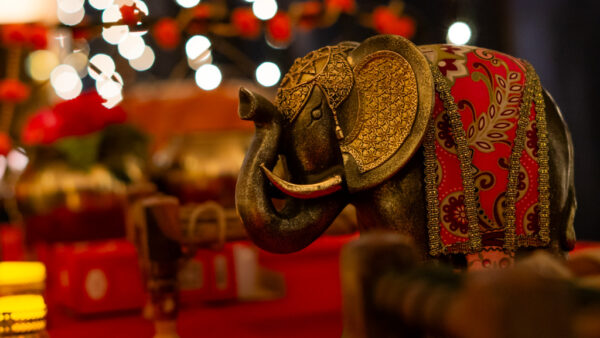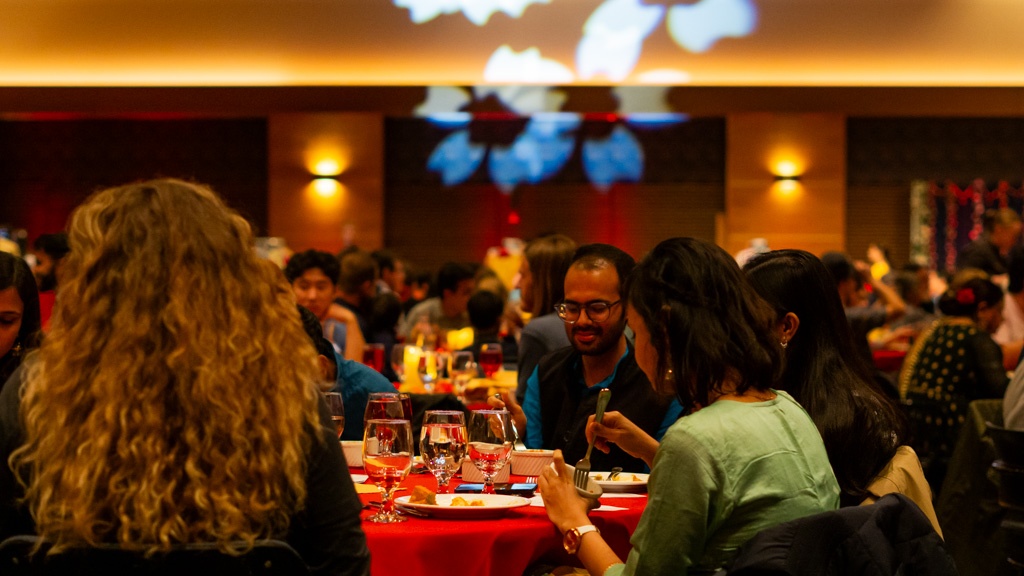Diwali Night: USU celebrates India’s festival of lights
With vibrant colors and lights, Diwali is the festival of the triumph of good over evil. Celebrated in many countries, its most considerable ties are to India, where it is recognized regardless of religion or background.
Students and community members from many walks of life celebrated the first night of Diwali, called Dhanteras, at Utah State University on Nov. 10 with dancing, food and a celebration of the many cultures that observe the holiday.
The Indian Student Association, which is a part of the Office of Global Engagement, organized the event.
Aishwarya Korkode, the president of ISA, said the event was put on for anyone in the community.
The community took that to heart, with a sold-out night and a 100% increase in attendees compared to last year’s Diwali Night. Not only did students show up, but there were also faculty, their families and community members.
Guests arrived at the TSC ballroom, and were greeted by an explosion of red fabric, the smell of curry and naan and the twinkling of decorative lights. Adorning every table was a menu, a program for the night and marigold flowers.
“Marigold flowers have a big significance back in our country,” Korkode said. “They are used for special festivals and occasions.”
As people took their seats, children ran between tables, laughing with friends they had just met.
A five-year-old in traditional Indian clothing smiled at his mom before zooming off hand in hand with another tyke.
All around the room, people caught up with each other and laughed, which is part of the spirit of Diwali. Even though various religions celebrate the holiday for different reasons, most celebrate the victory of light over dark, and good over evil.
Senior Vice Provost for Global Engagement Janis Boettinger described the feeling the holiday brought her in a speech.
“There is so much turmoil in this world, but I felt peace when I entered this room,” Boettinger said. “I can feel the light and the love.”
 © CWild Photography
© CWild Photography Decorations at the Diwali celebration at USU, Nov. 10, 2023.
The night began with a welcome from two members of the ISA, Vice President Maanav Choubey and Secretary Surbhi Verma. In their opening remarks, they shared the reason for the glowing ballroom’s fairy lights, tea lights and diyas.
“It is believed that the light of the diyas brings prosperity,” Choubey said.
Verma added to Choubey’s words as Boettinger lit the ceremonial lamp.
“The lighting is a symbolic gesture of hoping this light will bring a year of light, prosperity and happiness to us,” Verma said.
After the lighting of the lamp, the Shloka and two bhajans were performed by a group of children and women. The Shloka is a 32-syllable verse honoring Ganesha and asking for his blessings, while the bhajans are religious songs.
These recitals of holy words were followed by Ravi Gupta, department head of the history department at USU, and his sons performing traditional Indian music.
Gupta explained how music is traditionally taught in Indian culture.
“Indian music was not typically written,” Gupta said. “Rather, it’s an oral tradition; every sound has a name to it.”
The night was filled with drumming, singing and dancing. However, music wasn’t the only part of the night.
“Indian music is the second best thing after Indian food,” Choubey said.
Many seemed to agree with his statement, with the line for dinner stretching around the ballroom. The USU Event Catering team served chicken tikka masala, kadai paneer, jeera rice, naan and gajar halwa.
After dinner, more music and dance took center stage, along with a trivia game about Indian and Diwali history. The program ended with an expression of gratitude from the ISA to the sponsors of the event; then, the floor was open for dancing. A DJ played songs with influences from traditional Indian music, and the crowd began to party.
Diwali is an important holiday for many South Asian cultures, as it’s one of the few celebrated by almost every person there.
“India is a big country and the most populous in the world,” Korkode said. “This festival is celebrated all over India, so that’s why it’s such a big deal and why it’s so important to us.”
According to Korkode, getting to take the celebration and help bring it to life at USU has been a fantastic experience for both the ISA and the Logan community. At its core, Diwali is all about celebrating light and sharing love.
“Who doesn’t like lights and fireworks and good food and a good time?” Korkode said.

